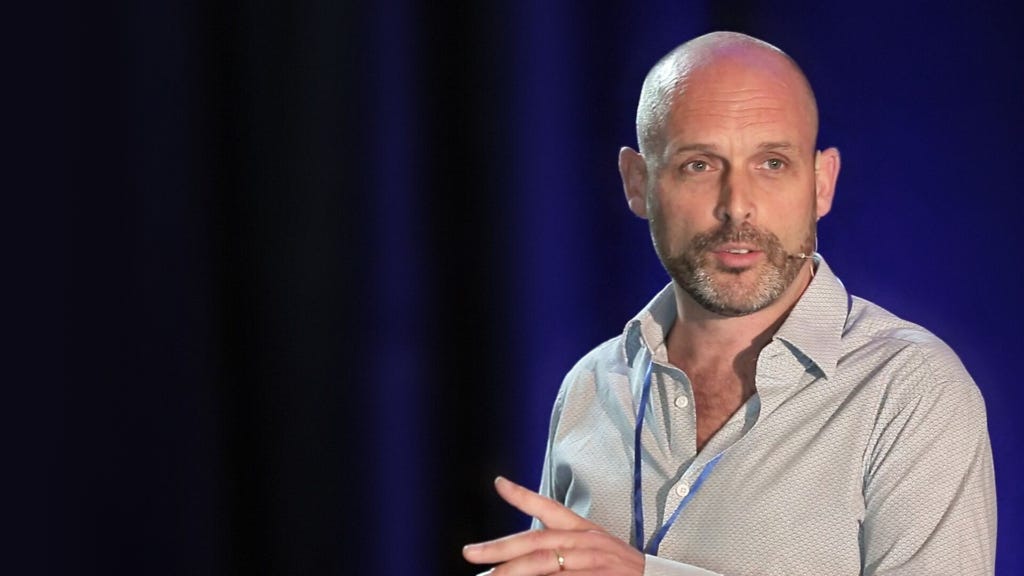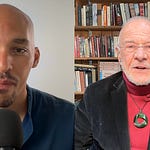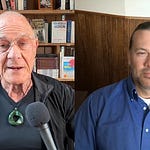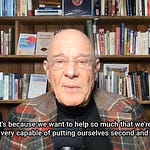Dear friends,
Over the years, I've encountered many voices challenging medical orthodoxy. Few, however, bring the scientific and analytical rigor of Ivor Cummins. A chemical engineer by training, Cummins approaches health science with the precision you'd expect from someone who spent 25 years solving complex industrial problems.
While I may not share all his conclusions (particularly his interpretation of COVID-19 data, where my firsthand experience suggests a more severe threat than his analysis indicates) his methodical dismantling of cholesterol myths and metabolic health dogma deserves serious attention.
What strikes me most about Cummins is his evolution from institutional defender to thoughtful skeptic. As he tells it, he once "lorded it over" those who questioned expert consensus. It took personal health challenges and deep research to reveal the gaps in medical knowledge that would transform his worldview. Whether discussing nutrition, metabolic syndrome, or the broader failings of our health institutions, Cummins brings an engineer's precision to separating signal from noise. In our conversation, you'll find a refreshing blend of data-driven analysis and provocative challenges to conventional wisdom. While we may not agree on everything, his call for rigorous skepticism in service of truth resonates deeply with my own journey in medicine.
Golden light,
Dr. Richard L. Miller
Links & Resources
Website: https://thefatemperor.com/
"Eat Rich, Live Long: Mastering the Low-Carb & Keto Spectrum for Weight Loss and Longevity" by Ivor Cummins and Dr. Jeffry Gerber
MetabolicDuo.com - Latest health and longevity platform
Twitter: https://twitter.com/FatEmperor
Facebook: https://www.facebook.com/TheFatEmperor
Instagram: https://www.instagram.com/ivorcummins/
Key Topics for Further Research:
"The Transmission of Epidemic Influenza" by Dr. Hope-Simpson (referenced in interview)
How a Chemical Engineer Discovered Troubling Gaps in Modern Medicine
When Ivor Cummins received concerning blood test results in 2012, he approached the problem like any engineer would - with rigorous analysis and skepticism. His subsequent journey from corporate problem-solver to health researcher reveals disturbing holes in our medical establishment's understanding of basic health markers.
Cummins spent over 25 years leading worldwide teams in complex problem-solving across all branches of science and technology. With additional credentials including a Stanford certificate in technical innovation, his expertise in rapidly resolving complex multifactorial issues would prove invaluable in uncovering troubling patterns in medical science.
His journey into medical research began with a personal health discovery that would challenge everything he thought he knew about institutional expertise.
Here's how Cummins describes that pivotal moment:
"I got some poor blood tests - cholesterol and a couple of other enzymes. They were so bad that I knew, wow, this is way outside the population normal distribution. Looks significant. Doctor was a little concerned. So I did my classic role, I slipped into my role of being brought in to lead a complex problem-solving team when they're in difficulty.
I grilled the doctor with two key questions: what are the implications of these kinds of numbers? And what are the root causes that I should start addressing to bring them back into range? And it was quite clear the doctor wasn't really sure at all, and these were standard blood tests. So I said, well, that's weird, maybe the doctor's an idiot. So I went to a more senior doctor, and long story short, a teaching professor of medicine after that. Same result."
What Cummins discovered through his own research was shocking - medical professionals seemed to lack deep understanding of the very metrics they used to make major health decisions:
"I spent a couple of evenings on Research Gate and PubMed and was way ahead of them. And I said, how can that be? I figured there must be something huge to be discovered. I had five kids and I was pretty interested in not dying early... The risk for high GGT ferritin is astonishing. The actuaries use those metrics. So it was a big deal."
Questioning Medical Orthodoxy: What Cummins Found in the Data
His discovery launched him into an obsessive study of metabolic health, insulin resistance, and cholesterol science. The more he dug into the research literature, the more concerned he became:
"I found out most of the papers published on cholesterol, when you actually dig into them, the abstract doesn't really reflect what's in the paper and the supplementary tables. When you could download and dig into the data, you could see through the kind of bias and chicanery. So I realized the cholesterol thing was utter nonsense."
Through weeks of intensive research, Cummins began mapping connections that seemed to elude his medical team. His investigation led him to Professor Reaven's work on Syndrome X (now known as metabolic syndrome), type 2 diabetes physiology, and the complex relationship between insulin resistance and various health markers. One breakthrough came when Cummins noticed patterns in the scientific literature that pointed to an unrecognized connection:
"I predicted and told my wife after two weeks - serum ferritin has to be a sixth marker for metabolic syndrome. Because you know you have low good cholesterol, hypertension, middle belly fat and a couple more... I came running out of my sitting room one Tuesday evening shouting because I found a paper from Asia that confirmed exactly what I'd theorized - that serum ferritin should be the 6th marker for metabolic syndrome."
But what troubled Cummins most wasn't just the gaps in understanding - it was the systematic nature of the misinformation around nutrition and health:
"Most of what we've been told in many aspects of nutrition and health is complete nonsense. Sadly, I mean, you flipped a coin, speaking of probabilities, they're telling us to eat more carbohydrates, to eat grains, to eat vegetable or seed oils, to avoid meat, to avoid eggs, which are superfoods... they've gotten nearly everything wrong. You couldn't guess 10-12 heads in a row, so it can't be random stupidity from the system."
This realization led Cummins to a disturbing conclusion about institutional bias:
"I had to go and look. And when I looked, I found out there was an enormous amount of data... The cholesterol thing was utter nonsense. Also, at first I couldn't believe it. But within a few weeks, I realized to a certainty... You know there's a profit motive. It can be political, but our world is just full of massive bias from the in-groups... Nearly everything or not nearly everything - a lot of stuff that's said in the legacy media and by politicians, I guess a lot of it's true, but on the real core things, the things of importance, they're mostly wrong. And it's not an accident, you know, there's an agenda."
Cummins points to the historical example of cholesterol research as emblematic of how profit motives can distort medical science:
"The classic driver was pretty much cui bono ['who benefits'] and it was the profit motive. So just quickly running through cholesterol - 1930s up to the fifties and sixties... but then it became an enormous industry and after that, you know, no one could be allowed to wise up because now you have one of the biggest drugs on the market, the statin class and even injectables now."
The Expanding Scope of Data-Driven Skepticism
For Cummins, his awakening to problems in medical science was just the beginning. The rigorous analytical approach that served him in engineering began revealing concerning patterns across multiple domains. His first major realization came during the 2008 financial crisis:
"My first awakening was the 2008 great financial crisis. You know, I had five kids. We had a big mortgage. I got burnt. So I spent a couple of weeks like I did with the blood metrics and I explored the world of macroeconomics and I found out how rotten it was... it was my first big shot across the bows that all of what we're told by bankers and economists - a lot of that is nonsense or avoiding what's really happening."
But it was his deep dive into health metrics that crystallized his understanding of how institutional bias operates. As an engineer proud of his profession, he had previously dismissed challenges to expert consensus:
"If people brought up things that you might consider sounding like conspiracy theories, I would lord it over them and dismiss them. Like I would say, like all the professors and all the experts are wrong? Yeah. And that was the way I was 20 years ago."
This transformed perspective led him to examine data more carefully across multiple fields. In his analysis of COVID-19 policies, for instance, he points to the Swedish data:
"Sweden did no lockdown, no masks, and they kept the kids up to 16 in school. When you look at the monthly deaths, they only had one big spike in the whole pandemic... When you look at the graph of mortality monthly from the Swedish government going back a hundred years... in the last 30 years, at least two, if not three, bigger mortality spikes in winter than COVID. And that's a country that has a very aged demographic."
For Cummins, the solution lies in individual agency and careful analysis rather than blind trust in institutions. He advocates practical steps citizens can take:
"We each do what we can to change the world as an individual. The first thing is to share the message of truth as in what's true... What the bad guys use is propaganda and censorship, and we need to bring the truth back by sharing truth insofar as at anywhere we can... But the other hand is to live the correct way... if they want you to eat ultra-processed junk food from a corporate pipeline shipped around the world, then insofar as you can buy locally from farmers and support them."
Taking Control of Personal Health in an Age of Misinformation
Cummins emphasizes that despite the concerning patterns he's uncovered, individuals can take meaningful steps to protect their health and autonomy. His recommendations stem from his engineering background - focus on measurable results and maintain healthy skepticism of institutional claims.
For those interested in metabolic health, he suggests starting with the basics - understanding your own metrics and their implications. This means not just accepting standard blood test interpretations, but digging deeper into what the numbers really mean for your health.
Perhaps most importantly, Cummins advocates maintaining intellectual independence while seeking truth.
And that’s something we should all agree on.
Now Available: Psychedelic Medicine at the End of Life
You can now order my latest book, Psychedelic Medicine at the End of Life: Dying Without Fear. This work represents a culmination of my decades-long journey as a clinical psychologist, exploring how psychedelics can transform our approach to death and dying.
The book examines how substances like LSD, MDMA, and psilocybin can be powerful tools in confronting our fears of mortality, ultimately leading to richer, more fulfilling lives. I'm honored to include insights from renowned experts in the field, as well as my own experiences.
Here's what some esteemed colleagues are saying:
James Fadiman, Ph.D., calls it "a deeply uplifting, clear, and compassionate guide to dying and how psychedelics, used correctly, diminish our fears about approaching the door that opens at the end of our life."
Charles S. Grob, M.D., describes it as "a masterful overview of an area of vital importance to our modern world... a valuable resource and contribution to the growing field of psychedelic medicine."
Julie Holland, M.D., notes that "Psychedelics may offer a mini-death rehearsal, offering a glimpse of spiritual oneness, enabling us to be less afraid at the end of our lives."
I hope this book will inspire meaningful conversations and new perspectives on how we approach the end of life.
My Books:
Psychedelic Medicine at the End of Life: Dying Without Fear (release date: November 5)
Freeing Sexuality: Psychologists, Consent Teachers, Polyamory Experts, and Sex Workers Speak Out
Psychedelic Wisdom: The Astonishing Rewards of Mind-Altering Substances
Psychedelic Medicine: The Healing Powers of LSD, MDMA, Psilocybin, and Ayahuasca
Integral Psychedelic Therapy (co-edited with Jason A. Butler & Genesee Herzberg)










